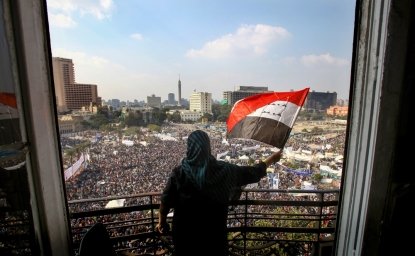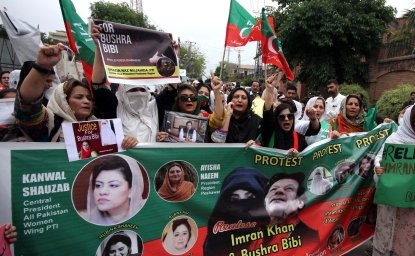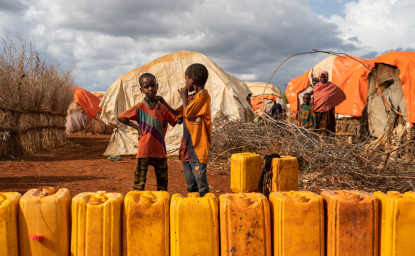This is an unedited transcript
Hello, I'm John Milewski, and this is Wilson Center. Now a production of the Woodrow Wilson International Center for Scholars. My guest today is Nader Nadery
He is a senior fellow at the Wilson Center's Indo-Pacific program, an associate fellow at the Asser Institute and a visiting fellow at the Hoover Institute. Nader previously served as commissioner of the Afghan Independent Human Rights Commission. He's just authored a new report. It's called Human Rights Under Siege Salvaging the International Rights Regime in a Turbulent World Order. Nader Great piece of work.
Thanks for joining us to talk about it. Thank you for having me.
So last year, end of last year, we marked the Universal Declaration of Human Rights 75th anniversary. I want to ask you for a little bit of a history lesson before we dive into your report. How much was accomplished in the 75 years from the start of that document and that that world order?
One way to talk about it. Well, thank you very much. There had been a lot achieved in the past seven half decades or seven decades. What we have had in the in the seven decades was a tall order of boat rules that begin with the Universal Declaration of Human Rights and then added with the international covenants, the civil and political rights, and many other international human rights laws, the body of international human rights laws were build up.
And then along with it, the institutional set up for human rights. A evolved, strengthened and expanded throughout the globe, both at the national level, but also internationally with the United State leading most of the way, but also most of the United States allies, including other countries in Asia, from China to to Egypt, involved in helping building these rules based order.
And in terms of develop the rules and joining hands. But US had a pivotal role in leading. Most of those are both in institutional but also in terms of the body of the laws that were built up, but also a movement that was led by civil society and academia, a movement of human rights defenders. Also of shape a new culture.
Both the legislature of culture, but also political culture, again led in the United States, supported generously through financial, but also through academic work, but spread and proliferated across the globe. And that new culture of forced domestic political actors, but also international actors to look into any of their actions in or within the lens of human rights and protection of human rights and the body of the institutions that were that are there to advocate human rights proliferated and expanded.
So significantly. And that's what we have had in a 75 years since the adoption of the Universal Declaration of Human Rights. So anyone who would read the report would see that what you have documented essentially is slippage in this international order. And I wonder why the report now, what were you observing which led you to dive into this and to do the research that you that ended up with this report?
Well, unfortunately, what we are witnessing, at least in the past one decade, there is a trend. And that trend, the first sign of it is an erosion of that, that multilateralism. And then also a rise in the nationalism, which this rise of nationalism have contributed into a decline in global advocacy for human rights, that the number of human rights violations and the countries that systematically moved from the protection of human rights, and then a more of of of rules that were that were in line with the global agenda and principles of human rights protection to more of of shying away from it and restriction and suppression of human rights in major part of the world.
Any study you look you see in the past ten years an increase in the level of human rights violations and a decline in rights and freedoms. The indicators on by Freedom House 2 to 2 to any other major studies on assessing the state of the liberties and freedom. It shows this trend. But at the same time, we see this trend of moving from multilateralism is also suggesting that institutions that were basically in charge or were effective in promoting human rights globally, in protection of of human rights globally, are losing their efficacy, too.
And that in itself is creating significant challenge both in the countries where you have authoritarian regimes, but also in the countries where you have protracted conflicts, but also in the countries that where democracy are not far from today, that increasing level of restrictions on rights and freedoms. And that made me to to look much more deeper, to see the root causes of this erosion of multilateralism.
And also that that advocacy for human rights. So that erosion of multilaterals on the rise of nationalism, not unrelated, the resurgence of authoritarian regimes. Have you given much thought to the whys? I know there's no single answer, but why is this happening now? Why is the world in the state it's in? Yes, indeed. The reports are trying to look and bring in a lot of data from both case studies of specific countries, too, that there are the conduct of the United Nations Security Council to primarily to a retreat of the United States and from a leadership role in promoting and advocating for human rights equally in all situations.
To to give one example. So the first one that that we look at is taking the significant role of the United States throughout this seven, seven decades in promotion of human rights. Currently, we do see that same level of significance of United State in erosion of multilateralism and an erosion of human rights advocacy, too. And therefore, when we look to policies that are stating to be human rights centric, but then the choices of policies and the options for policies in pursuit of foreign policies that the United States, different administration, especially in the past one decade, are taking, are contradictory to each other.
And that in itself is creating a situation where human rights defenders in those recipient countries or other countries who are looking at the United States, if it is keeping to its principles of human rights centric foreign policy, if the United States is acting in a contradictory to its policy in double standard, or it is treating friends and falls partners and non partners to the same standards and therefore holding to that high moral authority that the United States had.
So one, why is a decline in moral authority of the United States in human rights advocacy because of the wrong choices that were made, because of the contradictions between the policies and the measures and actions and options that the US have chosen in pursuit of PEU interest in foreign policy, not value based interest, as it was a norm during the the cold War and beyond.
So this obviously didn't happen overnight. And I think back to when Jimmy Carter was president, human rights was his calling card to the world and perhaps that was a high point in terms of emphasis on human rights. So we've seen a decline since then. Is it and is it based on what you just described, is it a focus on great powers competition at the expense of some of these values that had been front and center previously?
Yes, indeed. It didn't begin to begin overnight. So what I traced is through this report. It began 2021 and where the US first began to act as unilaterally. In most of the cases where I pursued, for example, the war on terror in pursuit of one objective, and that was to combat terrorism, not state of strong examples of drive, diverting and and moving away from its international obligation on human rights domestically and also internationally.
And then build on that. We have had situations in the past two decades which have resulted in pursuit of pure interest in global competition. So as we see this transition periods beginning of multilateralism, they unipolar a sea of gave in its way to multiple polarity. And in in this competition the pure short term interest has pushed the United States and the politicians, political leaders in Europe also to look for short term gains of short term partnership that are not based on values.
That wasn't the case in the past. And that in itself is pushing the United States to lose. One of it is significant and the important and effective tool of its foreign policy and its power, which was the soft power, which is the protection of the ideals of human rights and democracy. So this multipolar polarity and the big global compact power competition is pushing also to a wrong direction.
I've had this discussion with other guests under different contexts, but essentially the theme seems to be that the world is experiencing post-Cold War drift in defining a new world order and an organizing principle that we can all agree upon and that we can act upon. Do you do you see your work in that context? Is this part of a larger decline across the globe where nations are struggling to figure out exactly what the new alliances are, what the new priorities are, exactly as it happens in any transitions, the transitions are always made with confusions, with unclarity and fear and anxiety.
And it happens with big powers, too. And as we are going through a definition of new period of of of of of a world in terms of how this new period is going to be shaped. Now, a lot of conflicts, competitions in different regions partially over territory and new geopolitical situations that we have, but also competition and economy and all of that also is a competition of this type of governance that we are facing too.
And this new type of governance both go openly, but also among the the key allies is is a creating a pull and push. And what we do see the rise of China, the rise of other powers, not yet global powers, but major competitors in this arena. The US is struggling to define its role and I think it's not for power as a strong as leading as the United States to lose its side and be kind of be in a situation of panic, the to to lose where it shapes itself in this new global governance and in its new A orders of governance.
US have have had and has a longstanding history of sets of values and principles and the way of governance. It needs to look back to capitalize on those values and those strengths and not to rush or lose the side in this pull and push situation that defines this period of transition. One way to read your report is that it's a direct challenge to the United States to do what you just said.
I mean, you seem to describe the U.S. as I'm not sure you use this terminology, but you've heard it before, the indispensable nation in this equation, and that if the U.S. leads others may follow. Without U.S. leadership, things begin to become diffuse. Do you see this as essentially the you the the role of the United States to kind of put Humpty Dumpty back together again?
Because the erosion we've seen lack of trust in other institutions? The United Nations chief among those. Yes, indeed. The United States decisions and directions have a larger magnitude of impact on the direction that both American states, allies and the rest of the world would take. Now, the United States in need first to take a pause and look at it internally, because there's a lot of things happening internally, domestically, taking on on the issue of human rights.
Look at the level of parties and ship that is today very obvious and on display at the United States Congress, a place where once it was seen, at least on the core issues of values and principles like human rights and democracy, there being always a bipartisan consensus, both domestically and internationally, that are bipartisanship in support of these values in foreign policy and multilateral, in favor of multilateralism and also domestically is no more there.
So the first thing is that that pause need to be made there, not there's no need to be on these issues to be led by impulsive, short termism and populism driven by social media and led by social media impulses. That requires a leadership that's careful, that is calculated, that is also patient, are not tempted. The second issue is to look at the institutions that the United States itself shaped them globally.
The United Nation and its affiliated institutions, the United States in the past one decade, consistently and continuously tried to undermine the very institution that it put a lot of effort to build them. And it was part of it is strength in the past. Now the US needs to look back to revive those institutions, to give bring back legitimacy to those institutions.
The U.N. Security Council currently is a a place for gridlock, an absence of substantial conversation where concerns has to be built. It's polarized as it is the politics outside a U.N. headquarters in New York and the rest of the United States, in Europe and other places. So a move out of that is required to to enable back the United States to see much more clearly the new direction that it wants itself and the rest of its partners to try.
Nader In the report, you go through a series of case studies where you look at circumstances in Myanmar, Afghanistan and other places. Can I ask you to pick one and tell us how it illustrates the larger problem that you're discussing? I would pick two, if I may. Of course, you look at the countries, most of the five case studies that I present, that these are countries that either are currently major partners of the United States or they were a major partner and are currently a major recipient of United States aid throughout many, many decades.
And it is so to me to look at, for example, Afghanistan to begin with, Afghanistan in Afghanistan, the United States currently has is one of the major providers of the aid to not look creatively into the ways that the aid needs to make an impact in empowering human rights defenders and local communities to to defend for their own, to stand for their own right, and also to hold this very brutal authoritarian regime that's in power there to help to make sure that they are hold accountable and use its tools, for example, that the global Magnitsky's and Bell and sanctions and different tools at this position but that the region and internationally you see that not
much of those tools are being used. Or look at Bangladesh or Pakistan for that matter in Pakistan, aren't they? The United States annual country, a human rights report every year list a long list of human rights abuses, while at the same time the United States continue for a long time to provide, despite those human rights abuses reported by State Department itself provided a significant amount of aid 15 years, $15 billion.
Most of those aids were provided based on security interests. However, those short term security interests would not be sustainable because Pakistan, in key international arenas have not stood with the United States. So it's not a partnership based on on values, but it's based on a short term interest. On the other hand, you have India with a long list of human rights abuses also.
But because the United States have other priorities and in the Pacific region, therefore, the United State does not hold India accountable on human rights violation. It does not raise human rights violations there. So there is a divide between what is the state of policy to what policy options are chosen in favor of a short term interest, and that undermines the United States credibility in international stages, in defense of human rights.
Like any good report, you go on to make recommendations and you've touched on many of them already reviving U.S. leadership, U.N. reforms, rebuilding moral authority, prioritizing victims over strategic interests and sanctions or more use of the Magnitsky Act or more strategic use of it. There's one we haven't talked about yet that I find really interesting I ask you about now, which is expanding the coalition.
You talk about recruiting other nations to the cause, who maybe in the past have been more into the background and now may be ready for more of a leadership role. Could you talk about that and give us some specific examples of nations that that could be asked to play a more significant role? Because what we see today, only United State by itself, for example, when it comes to sanctions, cannot control many other financial institutions and many other avenues within which the abusers could escape the United States sanctions.
And therefore a coalition of like minded. For example, recently the U.K., Canada and the United States joined forces, and they have issued at the same time, collective sets of sanctions on those who who have violated human rights. And the impact of that has been much more significant because those individual are not anymore able to escape that jurisdiction of the US institutions.
Add to to go, for example, in Canada or to do businesses in U.K. Now that all collectively acting on that. But not only that, because we we are facing different regional economies which are somehow, if not completely independent of the bigger global economy or the U.S. economy, but at least they are in a smaller scale. Are having the capability of allowing those and the sanctions to operate in those economies.
For example, the Middle East region, countries like United Arab Emirates or Qatar or Kuwait and even India and other places are bigger enough economies that can absorb or provide platform for some of these abuses while their sanctions to be operating there. For example, there are two accounts who have been sanctions sanctioned by US Department of Treasury, but none of their their their assets are in the territory where the United States can stop them from accessing them.
Most of them are in the Middle East, in the United Arab Emirates and partly in Pakistan in informal economy in India. Those regional cooperation could enable the United States to act in those smaller markets to make much more effective the impact of the sanctions if it applies on individuals who are abusers. Great. Thank you. I want to get a final thought from you on sort of the soft science element of this.
When we talk about things like sanctions or whatever, you know, technical solutions might be applied. There's also just advocacy in general, right. Speaking out. You yourself have been a singular voice for human rights in your work. Nations do it as well. Can you talk about why advocacy matters? I mean, we see it in lessons from history that foreign or outside forces can only do so much to influence the politics or the reality within a nation, and yet it still seems to matter.
Could you speak to that? Is that the advocacy in in situations where the institutions of state are so repressive or allowing so limited access to its population for redress or for access to justice becomes so much significant, both nationally, domestically, but also internationally. So there are the human rights, the international human rights laws and the global set of rights and freedoms are not unique to only one sets of nations, not to the rest.
In my experience as a human rights activist and human rights commissioner, in a country like Afghanistan, the value I've seen in the most remote villages of the country, the most important elements of rights, are known to those individuals and are demanded not in the terms and language of the Universal Declaration of Human Rights. The same legal terminology, but for example, to be free from torture, to have the ability to speak your mind, to have access to education, to have to live with dignity, these are universally accepted rights sets are front and center.
It does not become restricted by any culture or any any certain history, and therefore those population do want and these rights to be to be respected and to be to be granted to them when when regimes are repressing or doesn't allow in the cases of violation or restricting those or allowed redress, then the advocacy becomes the key elements and therefore institutions of civil society domestically who are standing for human rights and protection of it, need to be supported morally by international institutions and those who share, like the United States and others who share the values of human rights.
To be morally supporting those institutions. If some if if the governments are repressive regimes or repressive and systematically violating human rights, for example, in case of a person, you have an application of gender apartheid against the entire population of a female population of the country, where the female population are mostly on the street demonstrating and demanding their rights are being suppressed there, it becomes a moral responsibility for advocacy for us and the rest of the those like minded nations to do, to stand with them and to do what it requires to be to be done.
And that's the strength of a bigger power like the United States with its soft power and the credibility that they had that need to be rebuilt. So that the nations added repressive governments could not stand against it, to say, hey, you're not doing it everywhere, you're selective. We don't believe in what you're doing and you don't have the credibility that need to be correct.
Nader Thank you for your ongoing work in this most important area and also for this terrific report. I want to tell our our viewers and listeners, if you'd like to read the entire report. And as much as we've talked about today, they're still that much more valuable information and analysis to be found in the full report. If you come to Wilson Center dot org and at the top of the page you'll see a programs tag tab.
And if you click on that, you'll find that the Indo-Pacific program and that's where you'll be able to download the report free of charge. Nader Again, thank you for the report and thank you for today. Thank you very much for having me. Thank for the conversation. We hope you enjoyed this edition of Wilson Center now and that you'll join us again soon.
Until then, for all of us at the center, I'm John Milewski. Thank you for your time and interest.










